- Home
- Arthur Miller
Broken Glass
Broken Glass Read online
Table of Contents
About the Author
Title Page
Dedication
Copyright Page
Act One
SCENE ONE
SCENE TWO
SCENE THREE
SCENE FOUR
SCENE FIVE
SCENE SIX
Act Two
SCENE ONE
SCENE TWO
SCENE THREE
SCENE FOUR
SCENE FIVE
PENGUIN PLAYS
BROKEN GLASS
Arthur Miller was born in New York City in 1915 and studied at the University of Michigan. His plays include All My Sons (1947), Death of a Salesman (1949), The Crucible (1953), A View from the Bridge and A Memory of Two Mondays (1955), After the Fall (1964), Incident at Vichy (1964), The Price (1968), The Creation of the World and Other Business (1972), and The American Clock (1980). He has also written two novels, Focus (1945) and The Misfits, which was filmed in 1960, and the text for In Russia (1969), Chinese Encounters (1979), and In the Country (1977), three books of photographs by his wife, Inge Morath. His most recent works include a memoir, Timebends (1987), and the plays The Ride Down Mt. Morgan (1991), The Last Yankee (1993), Broken Glass (1993), which won the 1995 Olivier Award for Best Play of the London Season, and Mr. Peters’ Connections (1998). He has twice won the New York Drama Critics Circle Award, and in 1949 he was awarded the Pulitzer Prize.
BY ARTHUR MILLER
DRAMA
The Golden Years
The Man Who Had All the Luck
All My Sons
Death of a Salesman
An Enemy of the People (adaptation of the play by Ibsen)
The Crucible
A View from the Bridge
After the Fall
Incident at Vichy
The Price
The American Clock
The Creation of the World and Other Business
The Archbishop’s Ceiling
The Ride Down Mt. Morgan
Broken Glass
Mr. Peters’ Connections
ONE-ACT PLAYS
A View from the Bridge, one-act version, with A Memory of Two Mondays
Elegy for a Lady (in Two-Way Mirror)
Some Kind of Love Story (in Two-Way Mirror)
I Can’t Remember Anything (in Danger: Memory!)
Clara (in Danger: Memory!)
The Last Yankee
OTHER WORKS
Situation Normal
The Misfits (a cinema novel)
Focus (a novel)
I Don’t Need You Anymore (short stories)
In the Country (reportage with Inge Morath photographs)
Chinese Encounters (reportage with Inge Morath photographs)
In Russia (reportage with Inge Morath photographs)
Salesman in Beijing (a memoir)
Timebends (autobiography)
Homely Girl, A Life (novella)
COLLECTIONS
Arthur Miller’s Collected Plays (Volumes I and II)
The Portable Arthur Miller
The Theater Essays of Arthur Miller (Robert Martin, editor)
VIKING CRITICAL LIBRARY EDITIONS
Death of a Salesman (edited by Gerald Weales)
The Crucible (edited by Gerald Weales)
TELEVISION WORKS
Playing for Time
SCREENPLAYS
The Misfits
Everybody Wins
The Crucible
To Inge Morath
PENGUIN BOOKS
Published by the Penguin Group
Penguin Books USA Inc., 375 Hudson Street, New York, New York 10014, U.S.A.
Penguin Books Ltd, 27 Wrights Lane, London W8 5TZ, England
Penguin Books Australia Ltd, Ringwood, Victoria, Australia
Penguin Books Canada Ltd, 10 Alcom Avenue,
Toronto, Ontario, Canada M4V 3B2
Penguin Books (N.Z.) Ltd, 182-190 Wairau Road,
Auckland 10, New Zealand
Penguin Books Ltd, Registered Offices: Harmondsworth, Middlesex, England
First published in Penguin Books 1994
Copyright © Arthur Miller and Inge Morath, 1994
All rights reserved
All inquiries concerning rights should be addressed to International Creative Management, 40 West 57th Street, New York, New York 10019.
Library of Congress Cataloging in Publication Data
Miller, Arthur.
Broken glass : a play / by Arthur Miller.
p. cm.
eISBN : 978-0-140-24938-5
1. Holocaust, Jewish (1939-1945)—Foreign public opinion,
American—Drama. 2. Jewish men—New York (N.Y.)—Drama.
3. Marriage—New York (N.Y.)—Drama. 4. Bankers—New York (N.Y.)—
Drama. I. Title.
PS3525.15156B76 1994
812’.52—dc20 93-20949
http://us.penguingroup.com
The play takes place in Brooklyn in the last days
of November 1938, in the office of
Dr. Harry Hyman, the bedroom of the Gellburg
house, and the office of Stanton Case.
CAST OF CHARACTERS
Phillip Gellburg
Sylvia Gellburg
Dr. Harry Hyman
Margaret Hyman
Harriet
Stanton Case
Ron Rifkin
Amy Irving
David Dukes
Frances Conroy
Lauren Klein
George N. Martin
Directed by John Tillinger
The original production was staged at the
Long Wharf Theater in New Haven,
Connecticut.
Final Acting Version
Act One
SCENE ONE
A lone cellist is discovered, playing a simple tune. The tune finishes. Light goes out on the cellist and rises on....
Office of Dr. Harry Hyman in his home. Alone on stage Phillip Gellburg, an intense man in his late forties, waits in perfect stillness, legs crossed. He is in a black suit, black tie and shoes, and white shirt.
Margaret Hyman, the doctor’s wife, enters. She is lusty, energetic, carrying pruning shears.
MARGARET: He’ll be right with you, he’s just changing. Can I get you something? Tea?
GELLBURG, faint reprimand: He said seven o’clock sharp.
MARGARET: He was held up in the hospital, that new union’s pulled a strike, imagine? A strike in a hospital? It’s incredible. And his horse went lame.
GELLBURG: His horse?
MARGARET: He rides on Ocean Parkway every afternoon.
GELLBURG, attempting easy familiarity: Oh yes, I heard about that... it’s very nice. You’re Mrs. Hyman?
MARGARET: I’ve nodded to you on the street for years now, but you’re too preoccupied to notice.
GELLBURG, a barely hidden boast: Lot on my mind, usually. A certain amused loftiness.—So you’re his nurse, too.
MARGARET: We met in Mount Sinai when he was interning. He’s lived to regret it. She laughs in a burst.
GELLBURG: That’s some laugh you’ve got there. I sometimes hear you all the way down the block to my house.
MARGARET: Can’t help it, my whole family does it. I’m originally from Minnesota. It’s nice to meet you finally, Mr. Goldberg.
GELLBURG: :—It’s Gellburg, not Goldberg.
MARGARET: Oh, I’m sorry.
GELLBURG: G-e-l-l-b-u-r-g. It’s the only one in the phone book.
MARGARET: It does sound like Goldberg.
GELLBURG: But it’s not, it’s Gellburg. A distinction. We’re from Finland originally.
MARGARET: Oh! We came from Lithuania ... Kazauskis?
GELLBURG, put down momenta
rily: Don’t say.
MARGARET, trying to charm him to his ease: Ever been to Minnesota?
GELLBURG: New York State’s the size of France, what would I go to Minnesota for?
MARGARET: Nothing. Just there’s a lot of Finns there.
GELLBURG: Well there’s Finns all over.
MARGARET, defeated, shows the clipper: ... I’ll get back to my roses. Whatever it is, I hope you’ll be feeling better.
GELLBURG: It’s not me.
MARGARET: Oh.’Cause you seem a little pale.
GELLBURG: Me?—I’m always this color. It’s my wife.
MARGARET: I’m sorry to hear that, she’s a lovely woman. It’s nothing serious, is it?
GELLBURG: He’s just had a specialist put her through some tests, I’m waiting to hear. I think it’s got him mystified.
MARGARET: Well, I mustn’t butt in. Makes to leave but can’t resist. Can you say what it is?
GELLBURG : She can’t walk.
MARGARET: What do you mean?
GELLBURG, an overtone of protest of some personal victimization: Can’t stand up. No feeling in her legs.—I’m sure it’ll pass, but it’s terrible.
MARGARET: But I only saw her in the grocery ... can’t be more than ten days ago ...
GELLBURG: It’s nine days today.
MARGARET: But she’s such a wonderful-looking woman. Does she have fever?
GELLBURG: No.
MARGARET: Thank God, then it’s not polio.
GELLBURG: No, she’s in perfect health otherwise.
MARGARET: Well Harry’ll get to the bottom of it if anybody can. They call him from everywhere for opinions, you know ... Boston, Chicago ... By rights he ought to be on Park Avenue if he only had the ambition, but he always wanted a neighborhood practice. Why, I don’t know—we never invite anybody, we never go out, all our friends are in Manhattan. But it’s his nature, you can’t fight a person’s nature. Like me for instance, I like to talk and I like to laugh. You’re not much of a talker, are you.
GELLBURG, a purse-mouthed smile: When I can get a word in edgewise.
MARGARET, burst of laughter: Ha!—so you’ve got a sense of humor after all. Well give my best to Mrs. Goldberg.
GELLBURG: Gellbu ...
MARGARET, hits her own head: Gellburg, excuse me!—It practically sounds like Goldberg ...
GELLBURG: No-no, look in the phone book, it’s the only one, G-e-1-1 ...
Enter Dr. Hyman.
MARGARET, with a little wave to Gellburg: Be seeing you!
GELLBURG: Be in good health.
Margaret exits.
HYMAN, in his early fifties, a healthy, rather handsome man, a determined scientific idealist. Settling behind his desk—chuckling: She chew your ear off?
GELLBURG, his worldly mode: Not too bad, I’ve had worse.
HYMAN: Well there’s no way around it, women are talkers ... Grinning familiarly: But try living without them, right?
GELLBURG: Without women?
HYMAN, he sees Gellburg has flushed; there is a short hiatus, then: ... Well, never mind.—I’m glad you could make it tonight, I wanted to talk to you before I see your wife again tomorrow. Opens cigar humidor. Smoke?
GELLBURG: No thanks, never have. Isn’t it bad for you?
HYMAN: Certainly is. Lights a cigar. But more people die of rat bite, you know.
GELLBURG: Rat bite!
HYMAN: Oh yes, but they’re mostly the poor so it’s not an interesting statistic. Have you seen her tonight or did you come here from the office?
GELLBURG: I thought I’d see you before I went home. But I phoned her this afternoon-same thing, no change.
HYMAN: How’s she doing with the wheelchair?
GELLBURG: Better, she can get herself in and out of the bed now.
HYMAN: Good. And she manages the bathroom?
GELLBURG: Oh yes. I got the maid to come in the mornings to help her take a bath, clean up ...
HYMAN: Good. Your wife has a lot of courage, I admire that kind of woman. My wife is similar; I like the type.
GELLBURG: What type you mean?
HYMAN: You know-vigorous. I mean mentally and... you know, just generally. Moxie.
GELLBURG: Oh.
HYMAN: Forget it, it was only a remark.
GELLBURG: No, you’re right, I never thought of it, but she is unusually that way.
HYMAN, pause, some prickliness here which he can’t understand: Doctor Sherman’s report ...
GELLBURG: What’s he say?
HYMAN: I’m getting to it.
GELLBURG: Oh. Beg your pardon.
HYMAN: You’ll have to bear with me ... may I call you Phillip?
GELLBURG: Certainly.
HYMAN: I don’t express my thoughts very quickly, Phillip.
GELLBURG: Likewise. Go ahead, take your time.
HYMAN: People tend to overestimate the wisdom of physicians so I try to think things through before I speak to a patient.
GELLBURG: I’m glad to hear that.
HYMAN: Aesculapius stuttered, you know—ancient Greek god of medicine. But probably based on a real physician who hesitated about giving advice. Somerset Maugham stammered, studied medicine. Anton Chekhov, great writer, also a doctor, had tuberculosis. Doctors are very often physically defective in some way, that’s why they’re interested in healing.
GELLBURG, impressed: I see.
HYMAN, pause, thinks: I find this Adolf Hitler very disturbing. You been following him in the papers?
GELLBURG: Well yes, but not much. My average day in the office is ten, eleven hours.
HYMAN: They’ve been smashing the Jewish stores in Berlin all week, you know.
GELLBURG: Oh yes, I saw that again yesterday.
HYMAN: Very disturbing. Forcing old men to scrub the sidewalks with toothbrushes. On the Kurfürstendamm, that’s equivalent to Fifth Avenue. Nothing but hoodlums in uniform.
GELLBURG: My wife is very upset about that.
HYMAN: I know, that’s why I mention it. Hesitates. And how about you?
GELLBURG: Of course. It’s a terrible thing. Why do you ask?
HYMAN, a smile:—I don’t know, I got the feeling she may be afraid she’s annoying you when she talks about such things.
GELLBURG: Why? I don’t mind. -She said she’s annoying me?
HYMAN: Not in so many words, but ...
GELLBURG: I can’t believe she’d say a thing like ...
HYMAN: Wait a minute, I didn’t say she said it ...
GELLBURG: She doesn’t annoy me, but what can be done about such things? The thing is, she doesn’t like to hear about the other side of it.
HYMAN: What other side?
GELLBURG: It’s no excuse for what’s happening over there, but German Jews can be pretty ... you know ... Pushes up his nose with his forefinger. Not that they’re pushy like the ones from Poland or Russia but a friend of mine’s in the garment industry; these German Jews won’t take an ordinary good job, you know; it’s got to be pretty high up in the firm or they’re insulted. And they can’t even speak English.
HYMAN: Well I guess a lot of them were pretty important over there.
GELLBURG: I know, but they’re supposed to be refugees, aren’t they? With all our unemployment you’d think they’d appreciate a little more. Latest official figure is twelve million unemployed you know, and it’s probably bigger but Roosevelt can’t admit it, after the fortune he’s pouring into WPA and the rest of that welfare mishugas. —But she’s not annoying me, for God’s sake.
HYMAN: ... I just thought I’d mention it; but it was only a feeling I had ...
GELLBURG: I’ll tell you right now, I don’t run with the crowd, I see with these eyes, nobody else’s.
HYMAN: I see that.—You’re very unusual - Grinning. - you almost sound like a Republican.
GELLBURG: Why?-the Torah says a Jew has to be a Democrat? I didn’t get where I am by agreeing with everybody.
HYMAN: Well that’s a good thing; you’re independent. Nods,
puffs. You know, what mystifies me is that the Germans I knew in Heidelberg... I took my M.D. there...
GELLBURG: You got along with them.
HYMAN: Some of the finest people I ever met.
GELLBURG: Well there you go.
HYMAN: We had a marvelous student choral group, fantastic voices; Saturday nights, we’d have a few beers and go singing through the streets.... People’d applaud from the windows.
GELLBURG: Don’t say.
HYMAN: I simply can’t imagine those people marching into Austria, and now they say Czechoslovakia’s next, and Poland.... But fanatics have taken Germany, I guess, and they can be brutal, you know ...

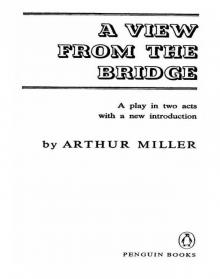 A View From the Bridge: A Play in Two Acts
A View From the Bridge: A Play in Two Acts Broken Glass
Broken Glass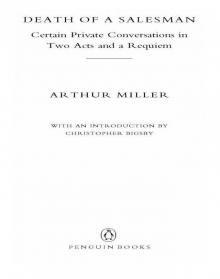 Death of a Salesman
Death of a Salesman Resurrection Blues
Resurrection Blues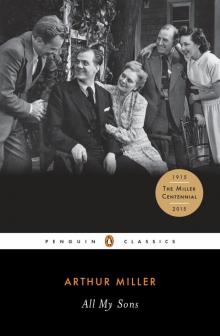 All My Sons
All My Sons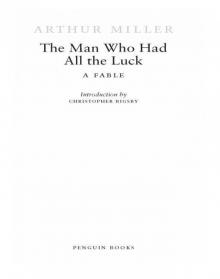 The Man Who Had All the Luck
The Man Who Had All the Luck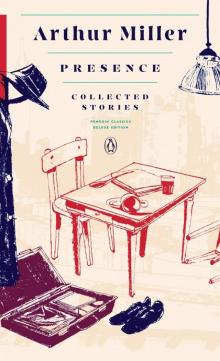 Presence: Stories
Presence: Stories The Crucible
The Crucible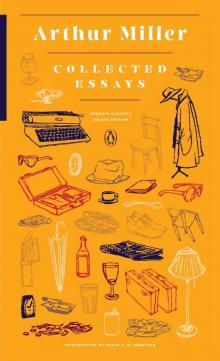 Collected Essays
Collected Essays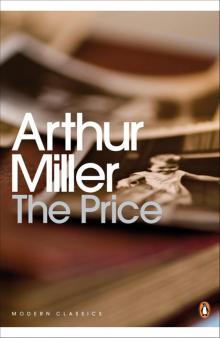 The Price
The Price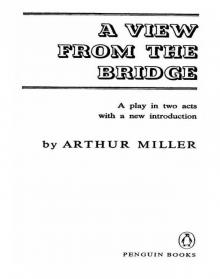 A View from the Bridge
A View from the Bridge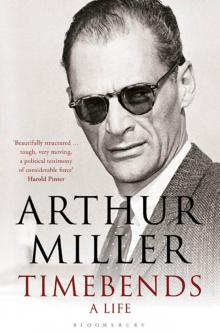 Timebends
Timebends The Penguin Arthur Miller
The Penguin Arthur Miller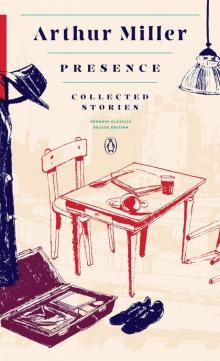 Presence
Presence